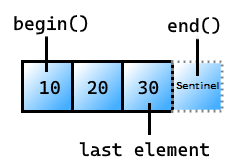transform_view クラス (C++ 標準ライブラリ)
各要素のビューは、指定された範囲内の要素の変換です。
構文
template<input_range V, move_constructible F>
requires view<V> && is_object_v<F> &&
regular_invocable<F&, range_reference_t<V>> &&
can-reference<invoke_result_t<F&, range_reference_t<V>>>
class transform_view : public view_interface<transform_view<V, F>>;
テンプレート パラメーター
F
要素を変換する関数オブジェクトの型。
V
基になるビューの型。
特性の表示
以下の項目の説明については、 View クラスの特性を参照してください。
| 特徴 | 説明 |
|---|---|
| 範囲アダプター | views::transform |
| 基になる範囲 | input_range以上を満たす必要があります |
| 要素の種類 | 変換関数の戻り値の型と同じです。 |
| 反復子カテゴリの表示 | 基になる範囲に応じて、最大random_access_rangeinput_rangeをサポートします |
| サイズ | 基になる範囲が満たされる場合のみ sized_range |
const対応 |
基になる範囲が const 可能であり、変換が const 参照で機能する場合にのみ。 |
| 共通範囲 | 基になる範囲が満たされる場合のみ common_range |
| 借用範囲 | いいえ |
メンバー
| メンバー関数 | 説明 |
|---|---|
| コンストラクターC++20 | ビューを構築します。 |
baseC++20 |
基になる範囲を取得します。 |
beginC++20 |
最初の要素を指す反復子を取得します。 |
endC++20 |
ビューの最後にあるセンチネルを取得します。 |
sizeC++20 |
要素の数を取得します。 基になる範囲は、 sized_rangeを満たす必要があります。 |
継承の対象 view_interface |
説明 |
backC++20 |
最後の要素を取得します。 |
emptyC++20 |
ビューが空かどうかをテストします。 |
frontC++20 |
最初の要素を取得します。 |
operator boolC++20 |
ビューが空でないかどうかをテストします。 |
operator[]C++20 |
指定した位置にある要素を取得します。 |
要件
Header: <ranges> (C++20 以降)
名前空間: std::ranges
コンパイラ オプション: /std:c++20 以降が必要です。
コンストラクター
のインスタンスを構築する transform_view
1) transform_view() requires default_initializable<V>
&& default_initializable<F> = default;
2) constexpr transform_view(V base, F func);
パラメーター
base
基になるビュー。
func
各要素を変換する関数。
テンプレート パラメーターの型の詳細については、「 Template パラメーターを参照してください。
戻り値
transform_view のインスタンス。
解説
transform_viewを作成する最善の方法は、views::transform範囲アダプターを使用することです。 範囲アダプターは、ビュー クラスを作成するための目的の方法です。 独自のカスタム ビューの種類を作成する場合は、ビューの種類が公開されます。
1) 値初期化 transform_viewを作成します。 変換関数と基になるビューは、既定で初期化可能である必要があります。
2) base ビューと変換関数funcからtransform_viewを移動します。 baseとfuncの両方がstd::move()経由で移動されます。
例: transform_view
// requires /std:c++20 or later
#include <ranges>
#include <iostream>
#include <vector>
#include <chrono>
using namespace std;
using namespace chrono;
void print(auto v)
{
for (auto x : v)
{
cout << x << ' ';
}
cout << '\n';
}
struct classes
{
string className;
weekday startDay;
};
int main()
{
std::vector<int> v{0, 1, 2, 3, -4, 5, 6};
// outputs 0 2 4 6 -8 10 12
print(v | std::views::transform([](int i) {return i * 2; }));
// ---- Modify the elements in the collection by returning a reference to the element to transform
std::vector<classes> theClasses = {
{"Math", Monday},
{"English", Wednesday},
{"History", Monday},
{"Science", Wednesday},
{"Art", Friday},
{"Music", Thursday}
};
// lambda to get a reference to the day of the week for a class
auto getDay = [](classes& c) -> weekday&
{
return c.startDay;
};
// If a class starts on Monday, change it to Tuesday
for (auto&& startDay : theClasses | std::views::transform(getDay))
{
// modify the startDay in the collection
if (startDay == Monday)
{
startDay = Tuesday;
}
}
// output classes and start times
for (auto c : theClasses)
{
std::cout << c.className << " : " << c.startDay << '\n';
}
}
0 2 4 6 -8 10 12
Math : Tue
English : Wed
History : Tue
Science : Wed
Art : Fri
Music : Thu
base
基になるビューを取得します。
// Uses a copy constructor to return the underlying view
constexpr V base() const& requires std::copy_constructible<V>;
// Uses std::move() to return the underlying view
constexpr V base() &&;
パラメーター
ありません。
返品
基になるビュー。
begin
ビューの最初の要素を指す反復子を取得します。
constexpr auto begin();
戻り値
ビューの最初の要素を指す反復子。 ビューに述語がない場合、動作は未定義です。

end
ビューの最後にあるセンチネルを取得します。
constexpr auto end()
戻り値
ビューの最後の要素に続く Sentinel:

size
ビュー内の要素の数を取得します。
constexpr auto size() requires ranges::sized_range<V>;
constexpr auto size() const requires ranges::sized_range<const V>;
パラメーター
ありません。
戻り値
ビュー内の要素の数。